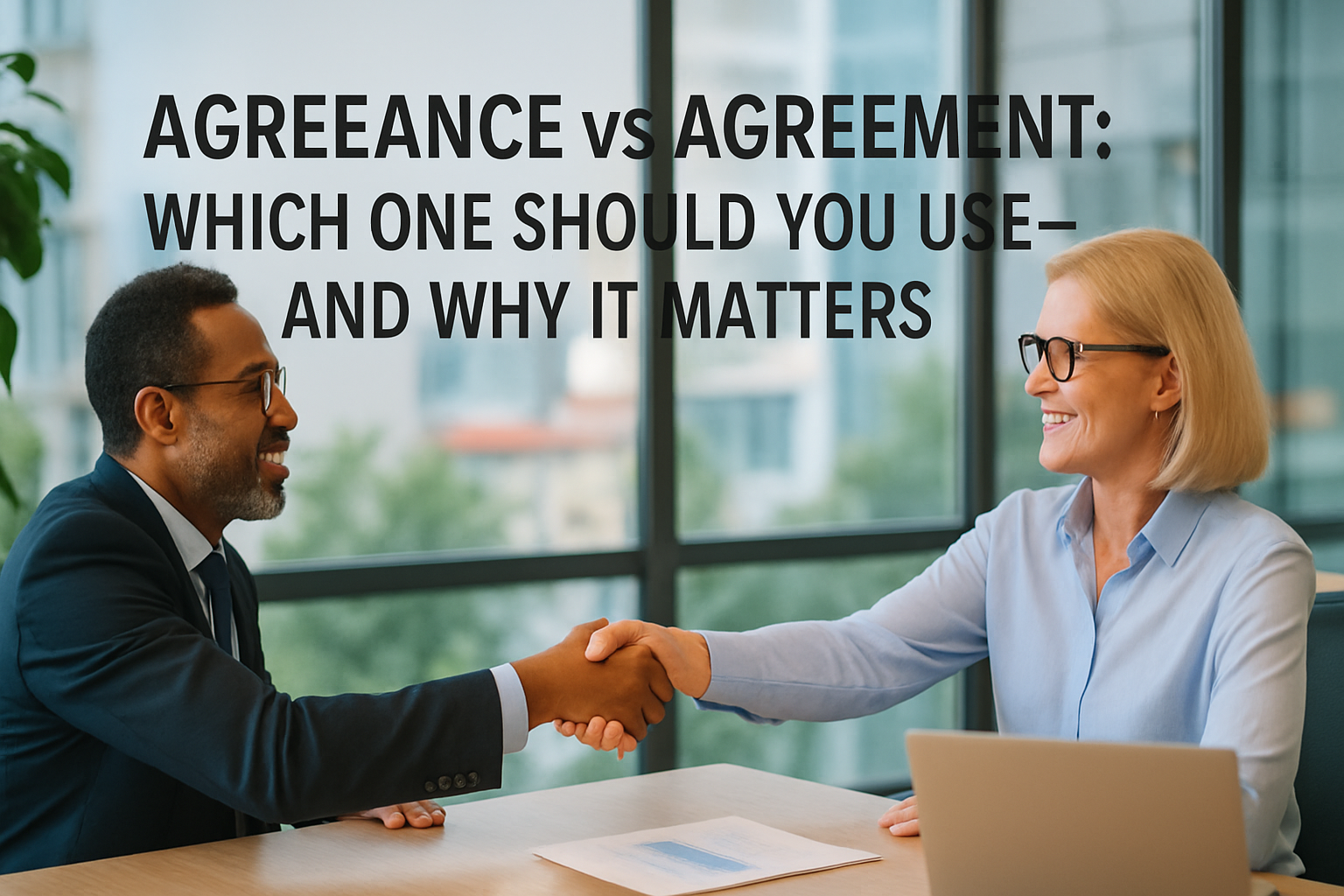Choosing between agreeance and agreement might seem trivial. Yet, using the wrong term can introduce confusion and undermine your credibility. This article dives deep into the difference, meanings, usage, and nuance behind these words—helping you write with clarity and confidence.
Understanding the Origins of Agreement and Agreeance
Both words stem from the verb agree, but their histories diverge:
- Agreement:
Traces back to Middle English and Old French agreer, meaning “to consent.” It entered English as agreement in the 14th century, instantly gaining widespread use in law, diplomacy, and everyday conversation. - Agreeance:
Also appeared around the same era, but usage dropped off by the 17th century. Found mainly in archaic texts, agreeance lingered quietly, resurfacing informally in recent decades—often overlooked or flagged as incorrect.
Read More About This Article: Trailer or Trailor: The Correct Spelling and Why It Matters
Usage Timeline Comparison
| Term | First Use | Peak Popularity | Modern Status |
|---|---|---|---|
| Agreement | 14th century | All eras—still standard | Universal acceptance |
| Agreeance | 16th–17th c. | Brief literary usage | Rare/archaic in modern usage |
So although both are rooted in the same concept, agreement dominates modern English.
Definitions at a Glance
Let’s compare the meanings directly:
| Word | Definition | Usage Frequency | Form | Connotation |
|---|---|---|---|---|
| Agreement | Mutual understanding, formal contract, consensus | Very High | Noun | Standard; formal/informal |
| Agreeance | The act of agreeing; concurrence (archaic) | Very Low | Noun | Rare; archaic, informal mood |
- Agreement covers both formal agreement (e.g., contracts) and informal agreement (e.g., casual consent).
- Agreeance rarely appears in serious writing. When it pops up, it often signals unfamiliarity or stylistic choice.
Agreement vs Agreeance in Formal and Informal Contexts
Formal Writing
- Agreement is standard: “The parties reached an agreement.”
- Agreeance looks out of place: “The parties reached an agreeance” feels archaic or incorrect.
Informal Writing
- Some might say: “I’m in agreeance with your point,” but it sounds clunky.
- More effective: “I agree with your point” or “I’m in agreement.”
Real-Life Examples
“By mutual agreement, we will commence the project next week.” ✅
“By mutual agreeance, we will commence…” ❌ (sounds off)
“I’m in agreement with your concerns.” ✅
“I’m in agreeance with your concerns.” ❌ (awkward)
Are There Subtle Nuances Between the Words?
Technically, agreeance means “the act of agreeing.” That nuance might sound appealing in casual chat. However:
- Agreement suggests concrete understanding or consensus.
- Agreeance can come across as abstract or vague.
- Clarity and communication quality decline when readers stumble over a term.
In most cases, sticking with agreement keeps your writing crisp and your readers engaged.
Clarity Counts: Language Psychology & Communication
Rare words disrupt reading flow. Linguistic studies show readers prefer familiar words for quicker comprehension. Using oddball terms like agreeance may:
- Reduce reader confidence
- Introduce ambiguity or uncertainty
- Signal inexperience in formal contexts
Stick with agreement for best results in communication and trust.
Examples in Context: Correct vs. Incorrect Usage
| Context | Incorrect | Correct | Better Alternative |
|---|---|---|---|
| Business | “We are in agreeance on the proposal.” ❌ | “We are in agreement on the proposal.” ✅ | “We agree on the proposal.” |
| Contract Law | “The contract is in agreeance.” ❌ | “The contract is in agreement.” ✅ | “The contract is agreed.” |
| Casual Chat | “I’m in agreeance with you.” ❌ | “I’m in agreement with you.” ✅ | “I agree with you.” |
Synonyms to Enhance Your Writing
Here are alternatives to avoid the old-fashioned agreeance:
- Agreement
- Accord
- Consensus
- Concurrence
- Understanding
Usage Tips
Use accord for formal or international contexts. Consensus is great for group decisions. Understanding improves emotional or relational tone.
How Style Guides Treat Agreeance
| Style Manual | Recommendation |
|---|---|
| Chicago Manual | Lists agreeance as archaic; use agreement |
| AP Stylebook | Only recognizes agreement |
| Merriam-Webster | Marks agreeance as uncommon or archaic |
| Oxford Dictionary | Shows agreeance as historical, not modern |
Style guides consistently discourage agreeance in modern writing.
Online Trends & Public Perception
- Google Trends: Searches for agreement outpace agreeance by a huge margin.
- Reddit, Quora: Instances of agreeance are often corrected or joked about.
- Writers get flagged on grammar forums advising: “Use agreement—agreeance sounds off.”
Common Questions & Misunderstandings
Is “agreeance” ever correct?
Only in very rare, archaic, or poetic uses, not in modern usage.
Can “agreeance” appear in academic writing?
No—stick with agreement for scholarly clarity.
Is “agreeance” slang?
It’s more archaic than slang. It may show up in informal speech but risks sounding unprofessional.
Does British English use “agreeance”?
No, both US and UK English favor agreement.
Final Word: Agreement Wins Every Time
In all but the most obscure literary contexts, you should use agreement. It works across:
- Formal ● informal
- Academic ● business
- Conversation ● contract drafting
If you ever spot agreeance, assume the writer opted for style over clarity—or simply made an error.
Conclusion: Choose Clarity Over Confusion
To recap:
- Agreement offers clarity, accuracy, and consistency.
- Agreeance brings awkwardness, obscurity, and potential misunderstanding.
- Always favor agreement, and if you want nuance, choose consensus, accord, or understanding.

